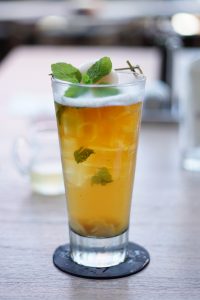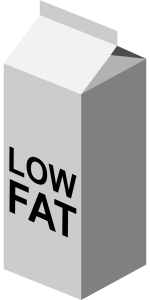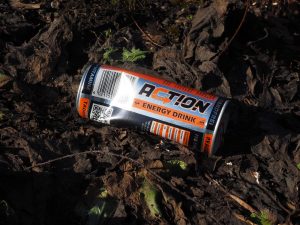Nutrition is an unstable field. Researchers are always telling us that something is healthy one day, and that it’ll kill the next. The food industry is even more deceiving – intentionally so – and sells us food they claim is healthy, but really isn’t. Here are the top culprits:
Anything labeled “low-fat”
We’ve been taught for years that fat is bad. However, only certain kinds of fat are actually unhealthy. When companies make something low-fat, they often are filtering out what makes a food good for us in the first place. They also usually add something back in that’s much worse. Low-fat salad dressings have tons of sugar, salt, and preservatives. Low-fat yogurt has the same problem.
Anything labeled “gluten-free”
Not too long ago, it seemed like everyone was trying a gluten-free diet. While some people are intolerant to gluten, most people are just getting the gluten from the wrong sources, like white bread. Getting gluten-free snacks doesn’t mean you’re eating anything healthy. The same amount of sugar is present, and the flours that replace wheat are sometimes just as high in carbs and calories.
Flavored water and sports drinks
Commercials would lead us to believe that flavored water and sports drinks somehow hydrate us better than water, but unless you’re a serious athlete or exercising a lot, you don’t need to be chugging down sweetened liquids. Even water that’s been flavored often has artificial colors and preservatives. Infuse your own water with hydrating ingredients like cucumbers and berries.
Flavored yogurt
The yogurt section of the grocery store is packed with options, but most of them are essentially candy bars in a little plastic cup. Yogurt that’s been flavored is full of sugar, even the brands that don’t use artificial ingredients. Even plain ol’ vanilla can really set you back. Get the plainest kind you can find without any added sugar, and sweeten it yourself with a little bit of honey and fruit.
Bottled green juice
Green juice is going through a boom, but most bottled, pressed juices are so full of fruit to make the drink sweet, it basically undoes any health benefits. These juices have also frequently been filtered, so there’s little to no fiber left. You’re much better off making your own green smoothies, where you can control the amount of sugar and fiber.

Bottled iced tea has to be better than soda, right? Depending on the brand, it will be better, but that doesn’t make it especially healthy. We’re used to sweet stuff, so tea makers add it by the spoonful. Even good tea brands that use real, high-quality brews often add so much, they’re offsetting the health benefits. Like with most foods, it’s a better idea to make your own tea.
Energy bars
These are similar to sports drinks in that most people don’t need them. Unless you’re burning a huge number of calories, these “energy” bars are too full of carbs and sugar. Even the bars with only a handful of real-food ingredients are really designed for athletes who will be burning off the whole thing in one workout session. Most protein bars also don’t have enough protein to offset the other ingredients. You’re much better snacking on nuts and other less-caloric food.
Spinach/vegetable pasta
Switching out your regular pasta with pasta supposedly made with vegetables may seem like a smart choice, but the reality is there’s so little actual vegetable in it, it’s really not much healthier than other pasta types. People often eat more of the veggie pasta because they think it’s better for them. The better choice is to get whole-wheat or whole-grain pasta, eat in moderation, and add lots of vegetables.
Want to know what’s in your food? Read this article on food additives.






